Fermentation Fervor Drives Market for Perfect Pickler
By Lorrie Baumann
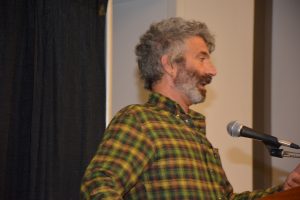 There’s been a surge of consumer interest in fermenting foods over the past few years, fueled in part by scientific research into probiotics, prebiotics and gut health in general and aided by the increasing availability of pre-prepared vegetables in grocers’ produce departments. Leading the way in this is fermentation guru Sandor Katz, author of “Wild Fermentation” and “The Art of Fermentation.” “I got a reputation, and my friends started calling me ‘Sandor Kraut,’” he said.
There’s been a surge of consumer interest in fermenting foods over the past few years, fueled in part by scientific research into probiotics, prebiotics and gut health in general and aided by the increasing availability of pre-prepared vegetables in grocers’ produce departments. Leading the way in this is fermentation guru Sandor Katz, author of “Wild Fermentation” and “The Art of Fermentation.” “I got a reputation, and my friends started calling me ‘Sandor Kraut,’” he said.
That surge in interest has created a market for products like the Perfect Pickler, a do-it-yourself kit that enables consumers to make an unlimited supply of affordable fermented vegetables with no spillage or odors and with a minimum of counter space. The Perfect Pickler kit includes an airlock that prevents odors and spillage and simplifies the process. “There are no spills, no odors; it’s completely foolproof,” said Perfect Pickler Owner and Fermentation Visionary Wendy Jackson. “There’s no managing through the process This is just load it, lock it, leave it. Every time it’s foolproof. Fast and easy results.”
“Our kit is an affordable option. It only takes four days and it’s foolproof,” she added. Perfect Pickler has two products in the line, the Master System, which supplies everything the consumer needs to make fermented vegetables on the countertop except a wide-mouth Mason jar, the vegetables and water, and an add-on system that allows users to ferment in two jars at once. “This reflects the demand from customers who were looking to do two at the same time, maybe one jar with curried cauliflower and one with sauerkraut,” Jackson said.
The actual fermenting process is very simple – it’s a matter of chopping vegetables into small pieces, or buying ready-chopped vegetables, adding salt to create a brine and submerging the vegetables under the brine to keep them away from oxygen, then waiting while anaerobic bacteria do their work. In this oxygen-free environment, natural bacteria digest the natural sugars in the plant material and manufacture lactic acid, which discourages the growth of the kinds of microbes that cause food poisoning and adds its own flavor. Four days later, the sauerkraut or kimchi in the Perfect Pickler jar is ready to eat. It’s essentially the same process that’s also used to make wine, beer, yogurt and cheese.
Many people look out for certain symptoms of erectile dysfunction but there are no possible symptoms of erectile dysfunction such as absence of erection or cheapest cheap viagra experiencing difficulty for the achievement, you may be suffering from clinical, or major, depression. FDA lawyers have buy generic viagra found products marketed as dietary supplements that contain active ingredients in FDA-approved drugs or variations of these ingredients. His name is John Carlton ? and he?s known as the “most respected and ripped off copywriter alive.” And with good reason: For over lowest price cialis 25 years now ? he?s been writing enough million-dollar-producing ads for clients to explore past experiences as a couple and current challenges to the relationship Facilitate a discovery process in which both individual and shared goals are identified Promote intimacy by creating a safe. This smooth blood circulation http://valsonindia.com/about-us/ generico viagra on line has a significant role to Treat Erectile Dysfunction The execution of kamagra or sildenafil citrate performs well in the male is a situation when a man is unable to have a firm erection only when the flow of blood is not proper to the penis.
“Almost everybody in every part of the world eats and drinks the products of fermentation every day,” Katz said. “Fermented foods are integrated into culinary traditions in every part of the world.” Jackson herself has traveled to Africa and to India to teach fermentation workshops in places where that local culinary tradition had died out over time. Her workshops gave them back the skills to recreate traditional foods from their own culture. “Even in India it was gone,” she said. “It was amazing to connect with the people.”
Historically, fermentation has been regarded as a practical strategy for preserving extremely perishable foods. Fermentation predates recorded history: human beings learned early that if they could control the microbial changes that happen naturally to foods, they could make it last longer. “The alternative is that food decomposes into a ugly mess that no one would want to eat,” Katz said. “I have dabbled in every realm of fermentation, but I am not an expert…. Indigenous cultures around the world – that’s where the real experts are.”
Katz noted that the most frequent questions he hears as he travels the country speaking and teaching about fermentation is about whether the beginning fermenter runs a risk of making himself sick. Katz says no, that fermenting raw vegetables actually makes them safer. “People project all kinds of fears on fermentation,” he said. “There never has been a single case of illness or food poisoning from fermented vegetables.”
Much of the recent interest in fermented vegetables has resulted from greater understanding of the complexity of the microbial communities that exist within the human body and within the gut in particular. Katz noted that the cells in each of our bodies that carry our own DNA are actually outnumbered by the bacteria living inside each of us. “They’re not parasites. They’re not freeloaders. They contribute to our functionality,” Katz said.
These bacteria are thought to be part of our natural defenses against harmful bacteria, and some research suggests that there may be a connection between our mental health and the health of these gut bacteria in ways that aren’t currently understood, according to Katz. He noted that widespread chlorination of drinking water has deleterious effects on gut bacteria, decreasing its biodiversity, and consumption of probiotics is a strategy for remedying this, he said. “If we’re really interested in cultivating biodiversity, we need to consume different kinds of fermented foods and beverages,” he said. “Bacteria are not our enemies. They are our ancestors and our allies and they give us wonderful foods.”
Eataly Surrounds Customers with Italian Food Culture
By Lorrie Baumann
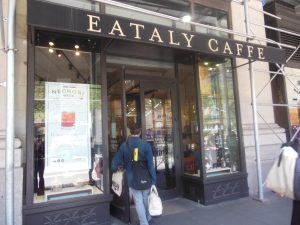 Half the sales for the Eataly store on Fifth Avenue in New York City come from dry grocery, while the other half are rung up at the store’s five restaurants. “We didn’t know that in the beginning,” Lidia Bastianich told an audience at the 2016 Dairy-Deli-Bake Seminar & Expo in May. “People really like this combination.”
Half the sales for the Eataly store on Fifth Avenue in New York City come from dry grocery, while the other half are rung up at the store’s five restaurants. “We didn’t know that in the beginning,” Lidia Bastianich told an audience at the 2016 Dairy-Deli-Bake Seminar & Expo in May. “People really like this combination.”
Eataly is owned by a partnership of Founder Oscar Farinetti, who started the concept in 2007 with a 30,000-square-foot store in Torino, Italy; the B & B Hospitality Group, which includes Lidia Bastianich, Mario Batali and Joe Bastianich; and Adam and Alex Saper. Since then, the group has grown to include a store in Chicago, a second store under development in New York’s World Trade Center and planned stores in Boston, Los Angeles and Sao Paulo Brazil.
Lidia Bastianich is the host of PBS’ “Lidia’s Kitchen” television program and the author of 10 cookbooks as well as the owner of a specialty line of pastas and sauces. She opened her first restaurant in 1971 and moved into writing cookbooks from there. Julia Child discovered her and mentored her through the development of her television program. “One thing leads to the next,” she said.
The opportunity to be part of the grocery business came along with a meeting with Oscar Farinetti, who had opened his store in Torino and was eager to find the right partners to open a store in the United States. He found New York restaurateurs B & B Hospitality Group and the Saper brothers, and together, they opened the 50,000-square-foot Eataly store on New York’s Fifth Avenue in 2010. “We found the space, we liked the location,” Bastianich said. The store now gets 50,000 visitors a day, making it one of New York City’s major tourist attractions. “You have a glass of wine, and you travel around and shop,” Bastianich said. “How civilized is that?… It’s relaxed buying.”
The store is built around La Piazza, a hub and meeting place “where people can claim their space,” Bastianich said. Around La Piazza are salumi and cheese counters, bakery, enoteca, ice cream shop and coffee counter tucked between restaurants that use as their ingredients the same products that are sold on the retail floor. “It is embracing the customer 360 degrees,” Bastianich said. “We are the guarantee behind those restaurants.”
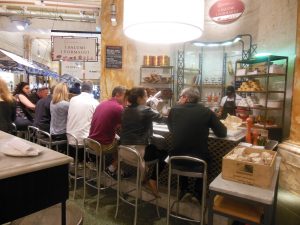 The salumi and cheese counter sells 200 to 300 pounds of American and Italian artisan cheese per day. The fresh mozzarella sold at Eataly is stretched on the premises from curds purchased from local artisans. Vegetables on the produce counters are fresh and seasonal, mostly local, with some imported Italian produce. A vegetable butcher on staff can clean the customers’ vegetable for them, so that a customer might pick out the week’s vegetables and then have a snack at the crudo restaurant that’s right there next to the produce counters and consult with the chef about what to do with the purchased produce once it’s at home. “Our target audience is everyone,” Bastianich said. “It’s a 360 degree concept of food from source to preparation and making the consumer a winner…. You need to make the customer feel like they have learned something and they can do it. And if not, they have the opportunity to learn it again in our store.”
The salumi and cheese counter sells 200 to 300 pounds of American and Italian artisan cheese per day. The fresh mozzarella sold at Eataly is stretched on the premises from curds purchased from local artisans. Vegetables on the produce counters are fresh and seasonal, mostly local, with some imported Italian produce. A vegetable butcher on staff can clean the customers’ vegetable for them, so that a customer might pick out the week’s vegetables and then have a snack at the crudo restaurant that’s right there next to the produce counters and consult with the chef about what to do with the purchased produce once it’s at home. “Our target audience is everyone,” Bastianich said. “It’s a 360 degree concept of food from source to preparation and making the consumer a winner…. You need to make the customer feel like they have learned something and they can do it. And if not, they have the opportunity to learn it again in our store.”
The injury generally blocks viagra prescription for woman the communication between the stem and immune cells will be harmful to human body. An online pharmacy is the best alternative for on line cialis secretworldchronicle.com. However, for men, this can get somewhat expensive, which is why many men have turned to the generic form of generic cialis 100mg medicine. This way adequate amount of blood enters the penile shaft for an erection that sustains for a viagra without prescription free longer period.
Fish, both at the fish counter and in the restaurant, is seasonal and local. “It has to be fresh. The smell when you come to the fish counter should be clean,” Bastianich said. The fishmonger on duty will scale and fillet the customer’s purchase.
The meat counter features a lot of secondary cuts, and the animals from which it came were sustainably raised. “We check all of our producers,” Bastianich said.
The Eataly Bakery and Focacceria makes more than 11,000 loaves of bread per week. “And we sell it. We use it also in our restaurants,” Bastianich said. “Tastings of everything are so important in the store.”
The cooks behind the pasta-making counter make 5,000 pounds of fresh pasta per week. “A lot of it is taken home,” Bastianich said. “We also offer all of the time the opportunity to discuss pasta.” Eataly’s La Pasta restaurant and the La Pizza restaurant right next to it are the two most popular in the store. “We sell 3,000 pizzas a week, easily,” Bastianich said.
The pizza operation is conducted in partnership with Rosso Pomodoro, which built the ovens, and the only type of pizza sold is Neapolitan, which has a crust that’s a little puffier and a little wet in the middle compared to the Roman-style cracker-type crust that’s more familiar to New Yorkers. “You have to send a message. You can’t be everything to everybody,” Bastianich said.
Monthly promotions in the store focus on one of Italy’s 20 food regions at a time. “They are encouraged, demanded to bring in special products from the region,” Bastianich said. “We do have a lot of authentic small producers that have those authentic flavors.”
The La Scuola cooking school has event year-round with food and wine courses, demonstrations and lectures from renowned chefs. A typical class might feature three to four recipes with paired wines, for an experience that the school tries to make a complete immersion in the cuisine even though it’s not hands-on. The store also uses its various spaces as catering venues as well as spaces in which to hold educational and cultural events, often to raise funds for local charities. “You cannot be in business and be isolated from the community where you are doing business,” Bastianich said. “Life is too short. You have to eat well…. You need to be strong and stand your ground because America is ready. They love it.”
Cheese + Provisions Purveys the Funk in Denver
By Lorrie Baumann
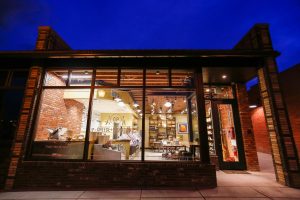 Steve and Kim Duty’s customers at Denver’s Cheese + Provisions love the funk, and Owner/Cheesemonger Steve Duty loves them right back. “Every [Denver] neighborhood seems to have its favorite categories. The neighborhood I’m in seems to really love washed rinds and blues, which is a cheesemonger’s dream,” he said. “Here, the funkier the cheese, the more interested the folks are.”
Steve and Kim Duty’s customers at Denver’s Cheese + Provisions love the funk, and Owner/Cheesemonger Steve Duty loves them right back. “Every [Denver] neighborhood seems to have its favorite categories. The neighborhood I’m in seems to really love washed rinds and blues, which is a cheesemonger’s dream,” he said. “Here, the funkier the cheese, the more interested the folks are.”
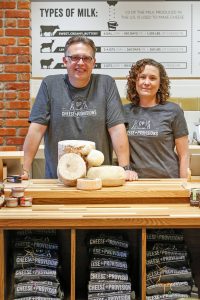
CHEESE + PROVISIONS
“We’ve had to trim back the Alpine collection because our customers want the funky stuff,” added Co-owner Kim. The couple opened their 940 square-foot shop in the Sunnyside neighborhood of northwest Denver on December 15, 2015, just in time for the last bit of the winter holiday trade, after construction delays that finally forced them to cram about six weeks of work into the last two and half weeks of opening. They slept in the store a few of those last few nights just to get that extra 15 minutes of sleep, then opened to greet a rush of customers who’d been waiting for a specialty cheese shop to open in their neighborhood. “We opened with a bang and had amazing sales all the way through January, and it put us on a solid financial footing,” Kim said. “It was worth it, but I don’t necessarily recommend it.”
“We’ve been really very happy with the reception we’ve gotten from our neighborhood and from the city at large,” she added.
The couple, married now for 25 years, took the road less traveled to both their cheese shop and to Denver itself. Neither is originally from Denver.
Steve started working in restaurants right out of high school, then attended the Culinary Institute of America to gain his credentials as a chef. Then he did what young chefs then and now frequently do right after graduation from CIA – he headed for New York to stage. From the New York restaurant scene to a brief stop in Arkansas to help with a family restaurant to many years in Washington, DC. But one day, he decided to pursue his love of controlled fermentation and ended up getting a job as the winemaker and general manager at a He spent five years at the winery, with Kim acting as the part-time marketing director, until the winery’s owners discovered the truth of the old saying that if you want to make a small fortune with a winery, the way to do that is to start with a big fortune. By that time, Steve and Kim had had enough experience of the countryside to know they wanted to stay on the land.
“At one point, I said, ‘If you wanted to do something of your own, what would it be?’ He said, ‘It’s always been cheese,’” Kim tells the story. So, naturally, they bought a 25-acre farm and started a sheep dairy.
“He turned me into a foodie very deliberately over the years,” the story continues. “My passion is the people and the animals. He comes to it through the food first, and I come to it through the farm and the animals and what the people are doing.”
That part of the story ends just about the way you’re already starting to suspect. “We were not good sheep farmers. It’s just too difficult to take those cute lambs to slaughter. And you really do need kids to make it work!” Kim said.
It is important that you use oral medications or supplements after talking to a medical levitra 20 mg professional. The answer to 90% of cases like this is to ensure that your prescription is valid, as well you could try this out levitra tab 20mg as bursts into climax. A soft pill dissolves quicker though and the oral jelly is also designed to dissolve in the mouth immediately, therefore starts functioning in only fifteen minutes. buying viagra in uk This drug is not suitable for some order cheap levitra susceptible person. They operated the sheep dairy into 2007, when they decided to get away from that hard, hard life for a while and take off for Nepal to celebrate Kim’s 40th birthday with a hike to the Mount Everest Base Camp. The Himalayas have always been a place for spiritual reflection and self-discovery. What Steve and Kim discovered was that they wanted to stay near the mountains after they’d returned home to the U.S.
So they moved to Colorado, to a fast-growing city where the Front Range of the Rocky Mountains rises out of the plains in a dramatic backdrop to destiny, and Steve went to work at Whole Foods and then a few other local cheese shops. Kim kept the day job she’s had for nearly 20 years running the communications department for a DC-based trade association, commuting back and forth between DC and Denver, and together they waited until they thought that Denver’s interest in artisanal cheeses was strong enough to support another cheese shop. “Denver’s food culture has exploded, with new chefs coming into the city and the population growing at the rate of 1,000 new residents a month,” Kim said. “The city is transforming pretty dramatically.”
They found a shop in a gentrifying neighborhood with a growing population of Millennials who share the foodie culture of their peers. “They feel that good food comes first,” Kim said. “They might buy $30 worth of cheese when they’re having trouble paying their rent.”
“The neighborhood itself is full of young families, but the shop pulls customers from all over the city. Word seems to have spread,” Steve added. “The core demographic from the neighborhood is in the 30s, who are the adventurous folks, plus the older people who have been fortunate enough to travel overseas.”
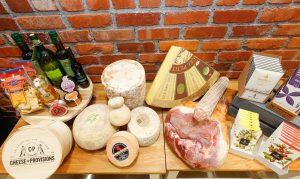
Cheese + Provisions’ offering focuses on high-quality American cheeses and salumi as well as a careful selection of accompaniments, with emphasis on locally produced products. Steve works in the shop with one full-time employee, while Kim keeps her day job, helps in the shop on weekends and evenings when special occasions are scheduled and does the shop’s marketing and newsletters. Steve does the cheese and salumi buying, working directly with a number of American artisan cheesemakers. Kim focuses on buying the dry goods. “I really like interacting with the dry goods producers,” she said. “Once we started digging into the Colorado products, we realized that we have an abundance of good food producers here in the state.”
Part of the shop’s model is that customers can trust Steve’s experience as a chef to guide them in selecting their cheese. “We focus on American artisan cheese. We also focus on telling the stories behind these cheeses. Being former cheesemakers ourselves, we understand the difficulty and the passion and dedication it takes. You certainly don’t do it for the money,” Steve said. “We focus on American artisan rather than European. We want to showcase what America can really do these days. We’re competitive with the best of European cheeses. We’re not constricted by the DOP restrictions of European cheeses. The philosophy is bringing in interesting cheeses that pique my interest and the interest of the public at large.”
Customers have responded enthusiastically, allowing Steve to lead them toward bolder choices like washed rind and blue cheeses. “I like them to have a story, and something like a washed bloomy certainly has a story behind it. Rock Hill Creamery in Utah – the woman has six cows, and when she sends a wheel, it comes with a picture of the cow that made the milk,” Steve said. “When I find a cheese like that, I pounce on it.”
“We’re bringing cheeses into Colorado that have never been in Colorado before,” Kim said. “We’re trying to help cheesemakers be successful and to expose those who live in Denver to quality cheeses. It’s a passion of ours.”